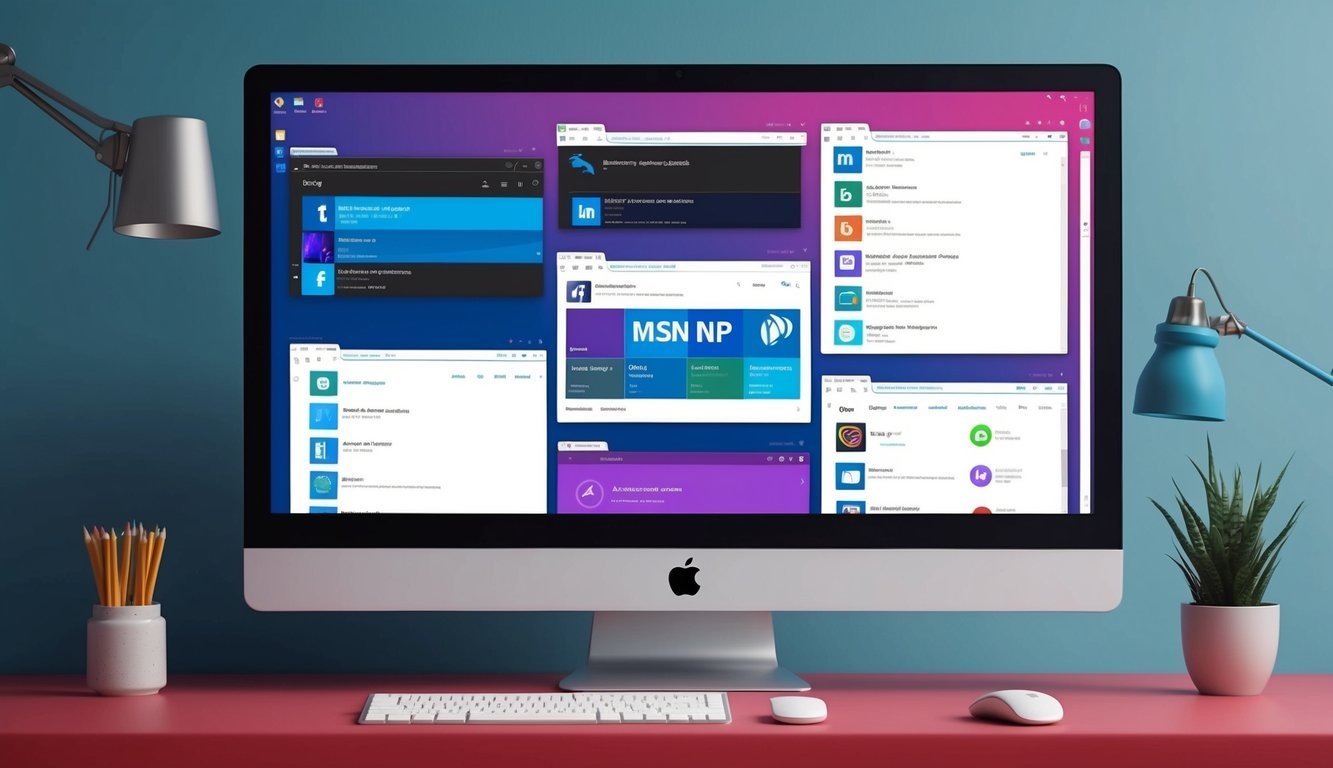If you’re considering advancing your nursing career, exploring MSN NP programs can be a valuable step.
These programs, which lead to a Master of Science in Nursing, prepare you to become an Advanced Practice Registered Nurse.
Through a combination of rigorous coursework and clinical practice, you’ll gain the skills necessary to provide high-quality healthcare as a Nurse Practitioner.
MSN NP programs typically require a Bachelor of Science in Nursing as a prerequisite and can be completed in two to three years. In these programs, you’ll learn to assess, diagnose, and manage patient care across various populations.
Many institutions, such as WGU and Drexel University, offer flexible online options to accommodate your professional and personal commitments.
With an MSN NP degree, you open doors to diverse roles in healthcare, from family practices to specialized clinics.
Not only will you enhance your clinical skills, but you’ll also be positioned for advanced leadership opportunities in the nursing field.
Understanding MSN NP Programs
MSN NP programs prepare you for advanced practice nursing roles, emphasizing both clinical skills and theoretical knowledge.
These programs cater to a range of specializations, allowing you to focus on your chosen area of interest within nursing.
Overview of MSN Degree
A Master of Science in Nursing (MSN) is an advanced degree that builds upon your Bachelor of Science in Nursing (BSN) and RN license.
It typically covers advanced nursing practices, healthcare leadership, and clinical decision-making.
An MSN equips you for roles in different specialties, such as Family Nurse Practitioner (FNP) or Psychiatric-Mental Health Nurse Practitioner.
Most programs require around 30-40 credits and can be completed in 2-3 years full-time, depending on the institution.
MSN FNP Program Structure
The MSN FNP program is designed for those who aspire to provide comprehensive family health care.
The curriculum combines theory, clinical practice, and hands-on experience.
Here’s a typical structure:
| Course Type | Credits |
|---|---|
| Core Nursing Courses | 20 |
| FNP Specialty Courses | 10 |
| Clinical Practicum | 5 |
| Total | 35 |
You will engage in coursework and approximately 600 hours of clinical practice.
This prepares you not only to diagnose and treat common conditions but also to focus on preventive care.
Specializations in MSN NP Programs
Many MSN NP programs offer specialized tracks to target specific patient populations.
These specializations may include:
- Adult-Gerontology Nurse Practitioner: Focuses on adult patients, emphasizing chronic disease management.
- Pediatric Nurse Practitioner: Specializes in the care of children from infancy to young adulthood.
- Neonatal Nurse Practitioner: Provides care for newborns in intensive care settings.
- Women’s Health Nurse Practitioner: Concentrates on women’s reproductive health issues.
- Psychiatric-Mental Health Nurse Practitioner: Addresses mental health disorders across the lifespan.
Each specialization includes tailored coursework and clinical experiences to ensure you meet the unique needs of your patients in that area.
For more details on specific programs and requirements, you can explore resources like Nurse.org.
Curriculum and Core Competencies
The curriculum of MSN NP programs integrates essential knowledge and skills necessary for advanced nursing practice.
It encompasses core courses, clinical experiences, and specialty nursing areas to ensure comprehensive training.
Core Courses and Support Courses
In MSN NP programs, core courses provide the foundational knowledge required for nursing practice.
Key subjects typically include Health Assessment, Advanced Pharmacology, and Advanced Pathophysiology.
| Course | Description |
|---|---|
| Health Assessment | Focuses on comprehensive physical assessments. |
| Advanced Pharmacology | Covers pharmacological principles and medication management. |
| Advanced Pathophysiology | Examines disease mechanisms affecting patient care. |
Support courses may include Epidemiology and Population Health, which contextualize health issues within communities.
These courses equip you with the skills to assess health trends and implement evidence-based interventions.
Clinical and Field Experiences
Clinical hours are a critical aspect of MSN NP programs, helping you apply theoretical knowledge in practical settings.
The program typically requires a minimum number of clinical hours that vary by institution.
During these experiences, you engage directly with patients, focusing on Disease Prevention and Health Promotion.
You develop skills in patient care while collaborating with healthcare teams, enhancing your ability to provide holistic and evidence-based care.
Specialty Nursing Courses
Specialty nursing courses allow you to concentrate on specific areas such as family practice, pediatrics, or geriatrics.
You learn essential competencies tailored to your chosen practice, integrating knowledge with hands-on experiences.
These courses often combine Evidence-Based Practice with advanced clinical training, ensuring you can assess and implement effective patient care strategies.
The focus on population-specific competencies prepares you to address diverse patient needs effectively.
Licensure and Certification

Obtaining licensure and certification is essential for your career as a Nurse Practitioner (NP).
These processes ensure you meet the required standards to provide quality care to patients.
Understanding the examination and licensure requirements will guide you through your professional journey.
National Certification Exam
Before you can practice as a Nurse Practitioner, you must pass a national certification exam.
The two primary certifying organizations are the American Association of Nurse Practitioners (AANP) and the American Nurses Credentialing Center (ANCC).
| Certification Body | Examination Focus | Eligibility Requirements |
|---|---|---|
| AANP | Adult-Gerontology, Family, Pediatric | Hold an MSN or DNP, complete specific NP courses |
| ANCC | Family, Psychiatric-Mental Health | Similar educational credentials required |
You will choose an exam based on your specialty area.
Once you pass, you earn the title of Certified Nurse Practitioner (CNP), which is vital for your practice.
Licensure as an APRN
Following national certification, you must obtain licensure as an Advanced Practice Registered Nurse (APRN) in your state.
This process typically involves submitting your certification and proof of your education.
Requirements for APRN licensure can vary by state.
It often includes:
- Background checks
- Application fees
- Proof of continuing education if required by your state
Ensure that you confirm your state’s specific requirements through the National Council of State Boards of Nursing (NCSBN) or your state board of nursing.
Your licensure allows you to practice legally and prescribe medications as an NP.
Role Development and Professional Issues

Understanding the nuances of role development and professional issues is crucial for advancing in MSN NP programs.
This involves navigating your scope of practice, enhancing autonomy, and engaging effectively in leadership and collaborative environments.
Each aspect is significant for your growth and effectiveness in the healthcare field.
Scope of Practice and Autonomy
As a Nurse Practitioner (NP), your scope of practice defines what you can legally do in your role, which varies by state or country.
Familiarizing yourself with these regulations is essential to practice confidently and competently.
Your autonomy is fundamentally tied to this scope.
With increasing responsibilities, you will make critical decisions regarding patient care.
This independence is supported by educational pathways, including the MSN NP programs, which equip you with advanced clinical skills.
It’s crucial to regularly assess and advocate for your scope of practice, ensuring it aligns with current laws and public health needs.
Engaging in professional organizations can help you stay informed about these matters.
Leadership and Interprofessional Collaboration
Leadership in healthcare requires a blend of skills, including communication, decision-making, and advocacy.
As an NP, you will often lead teams, influencing not only your practice but also patient outcomes.
You’ll also emphasize interprofessional collaboration.
Working alongside physicians, social workers, and other healthcare professionals can enhance patient care.
Effective collaboration ensures that you promote a holistic approach to patient health.
Key leadership qualities you should cultivate include:
- Communication: Clear and open lines of dialogue.
- Conflict resolution: Managing disagreements positively.
- Advocacy: Championing patient rights and healthcare policies.
Professional Role Development
Your professional role development establishes the foundation for your career as an NP.
Transitioning from a registered nurse to an NP involves shifts in identity and responsibility.
Educational programs, like those offered in MSN NP pathways, foster this growth by enhancing your clinical knowledge and skills.
Mentorship is another vital component, providing guidance and support as you navigate your new role.
Remaining engaged with professional development helps you adapt to changes within the nursing field.
Staying updated with current research allows you to deliver evidence-based care, reinforcing your professional identity and credibility.
Participating in ongoing education, workshops, and certification courses can be beneficial for continuous growth in your nursing career.
Career Opportunities and Advanced Practice

As a graduate of a Master of Science in Nursing (MSN) Nurse Practitioner (NP) program, you have a range of career opportunities.
These roles span various employment settings, offering both diversity and specialization.
Additionally, pursuing further education through Doctor of Nursing Practice (DNP) programs can enhance your skills and knowledge in advanced nursing practice.
Employment Settings and Job Roles
You will find opportunities in various settings, including:
| Setting Type | Potential Roles |
|---|---|
| Primary Care Providers | Family Nurse Practitioner, Adult Nurse Practitioner |
| Hospitals | Clinical Nurse Specialist, Acute Care Nurse Practitioner |
| Clinical Settings | Community Health Nurse, Mental Health Nurse Practitioner |
As a Nurse Practitioner, your responsibilities may include diagnosing and treating patients, conducting physical exams, and providing health education.
You may work in collaboration with physicians and other healthcare providers to deliver comprehensive care.
The demand for Nurse Practitioners continues to grow, particularly in underserved areas, making this a critical and rewarding field.
Continuing Education and DNP Programs
To advance your career, you should consider pursuing a Doctor of Nursing Practice (DNP) degree.
This program can further deepen your expertise and prepare you for leadership roles in healthcare.
You may also explore options to enroll in a Post-Graduate APRN Certificate Program for specialization in areas such as gerontology or pediatrics.
Many institutions offer Nurse Practitioner Online programs, providing flexibility to continue your education while balancing work commitments.
Advanced nursing practice roles often require continual education to stay updated with healthcare innovations and practices.
Engaging in these programs is essential for maintaining licensure and enhancing your professional competencies.

